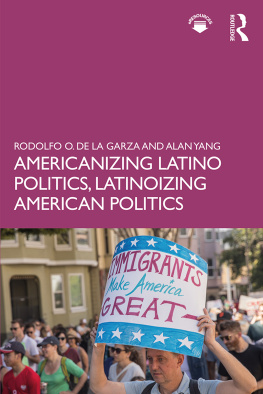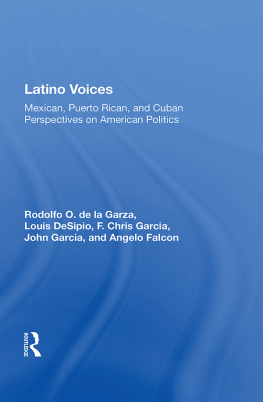First published 2004 by Paradigm Publishers
Published 2016 by Routledge
2 Park Square, Milton Park, Abingdon, Oxon OX14 4RN
711 Third Avenue, New York, NY 10017, USA
Routledge is an imprint of the Taylor & Francis Group, an informa business
Copyright 2004, Taylor & Francis.
All rights reserved. No part of this book may be reprinted or reproduced or utilised in any form or by any electronic, mechanical, or other means, now known or hereafter invented, including photocopying and recording, or in any information storage or retrieval system, without permission in writing from the publishers.
Notice:
Product or corporate names may be trademarks or registered trademarks, and are used only for identification and explanation without intent to infringe.
Library of Congress Cataloging-in-Publication Data
Garza, Encarnacin, 1950
Resiliency and success : migrant children in the United States/Encarnacin Garza, Pedro Reyes, and Enrique T. Trueba.
p. cm.
ISBN 1-59451-044-x (hardcover : alk. paper) ISBN 1-59451-045-8 (pbk. : alk. paper)
1. Children of migrant laborersEducationUnited States. 2. Mexican AmericansEducation. 3. MexicansEducationUnited States. I. Reyes, Pedro, 1954 II. Trueba, Enrique T., 1931 III. Title.
LC5151.G37 2004
371.82624dc22
2004001901
Designed and Typeset by Straight Creek Bookmakers.
ISBN 13 : 978-1-59451-044-1 (hbk)
ISBN 13 : 978-1-59451-045-8 (pbk)
CONTENTS
CHAPTER I
The Immigration Experience and Resiliency of Mexican Families in the United States
CHAPTER II
Migrant Farm Workers and their Children
CHAPTER III
The Struggles of the Migrant Lifestyle
CHAPTER IV
The FamilySupport and Influence
CHAPTER V
The School
CHAPTER VI
The MentorsEnvironmental Resources
CHAPTER VII
The PresentSuccess Against All Odds
CHAPTER VIII
Analysis of Central Research Questions
CHAPTER IX
Lessons Learned about Critical Ethnography and Pedagogy
PREFACE

AWARENESS IS MEANINGLESS UNLESS IT INSPIRES AND IS FOLLOWED BY CHANGE. This study was about a long-ignored and yet well-researched group of people. The image of this group has been constructed in a way that locks them in a perpetuating cycle of failure. Consequently, many educators are convinced that the children of farm workers (the ghost workers) will never be able to fly to high-achieving positions. Sadly, many of these students are led to believe that they are intrinsically inferior, or that it is their fate to follow the path of hopelessness that has been imposed on them for generations.
The attrition rates among the migrant student population have been phenomenal, and we know enough about the factors that contribute to this failure. Educational practitioners have been exposed sufficiently to this type of research. It is here precisely where the problem rests. The subliminal messages about the alleged inability of Hispanic children to succeed in schools are abundant and frequent. However, in spite of these predominant messages, there are many stories of success that have not been told.
With this in mind, the main purpose of this study was to elucidate the amazingly successful life journeys of academically invulnerable migrant students. One of the goals of this study was to invite readers, educational practitioners, policymakers, and researchers to transition from a primary phase of awareness to a more advanced phase of transformation and commitment to change. It is critical to use this awareness and sensitivity in a way that generates significant changes in attitude and behavior. We want to raise the expectations of educators about the talents, capabilities, and competence of migrant students.
Who are these children? In many cases these students have been referred to as the invisible children, or the children of ghost workers. Being invisible is not the worst of circumstances because it at least implies that they exist, even if they cannot be seen. However, in other instances, they are not even acknowledged. They are treated as if they do not exist at all. This mystery child is known as the migrant student. There is a misconception that because of technological advances in agriculture, migrant farm workers are being displaced. Educators need to accept that this special population is increasingly growing in numbers. These students have long been in our schools and will continue to be there for a long time.
The literature is rich with accounts about the plight and demise of the Hispanic migrant student. Many studies have been conducted to explain why so many Hispanic students are failing in schools. Their poor achievement record has been consistently linked to a variety of sociocultural factors that compel Mexican American students to academic failure. The assumption of these findings is that the Hispanic child does not have the necessary competencies, values, and personal characteristics to succeed in Americas schools.
Though Hispanics long preceded the present dominant group, they have remained foreign in their communities and invisible in their schools. Historically, they have not been expected to become participating members of the American way of life (Carter & Segura, 1979). The following quote illustrates similar views from a teacher in the Rio Grande Valley in the 1960s:
They are a good people. Their only handicap is the bag full of superstitions and silly notions they inherited from Mxico. When they get rid of these superstitions they will be good Americans. The schools help more than anything else. In time, the Latinos will think and act like Americans. A lot depends on whether we can get them to switch from Spanish to English. When they speak Spanish they think Mexican. When the day comes that they speak English at home like the rest of us they will be part of the American way of life. I just dont understand why they are so insistent on using Spanish. They should realize that its not the American tongue. These children may seem backward at first but its not their fault. They just dont understand what is being said in class. They are bright but they dont speak our language. (Madsen, 1966, p. 106)
By focusing on the reasons for failure of Hispanic students in a system designed for mainstream white upper- and middle-class children, these types of studies have failed to generate effective long-term solutions. These students have been placed in demeaning and stigmatizing remedial pullout programs that have served to perpetuate negative teacher attitudes and low expectations about Hispanic students.
Not much emphasis has been given to Hispanic students who have overcome the obstacles and barriers impeding success. Little is known about the Hispanic student who is academically invulnerable (Alva & Padilla, 1995). If little is known about the successful Hispanic student, much less is known about academically successful Hispanic migrant children in U.S. schools. To address this problem, we have undertaken this project to probe into the lives of academically invulnerable Hispanic migrant students.
We have approached the study of migrant students from an ethnographic perspective, using qualitative approaches that require fine-tuned analysis of ethno-historical and interview data. We feel that this approach is essential to understand modern American society and its schools. We must first understand immigrant families and their children, who constitute the greatest portion of new students in the largest cities of this country. We cannot begin to plan appropriate pedagogical approaches for migrant students until we realize that (a) they are here to stay, (b) we know very little about them, and (c) their home language and culture are being discarded by schools, and educators are losing the most powerful means to reach these students. According to Alva and Padilla (1995), most of the current research of Hispanic students has focused on how sociocultural factors contribute to their failure in school. These studies have helped to develop and to justify acceptance of the dangerous and damaging deficit model. In educational circles, this model is often referred to as the culturally different paradigm. It is accepted by many teachers and condoned by many school administrators as a way to explain why minority students fail to perform according to standards.













